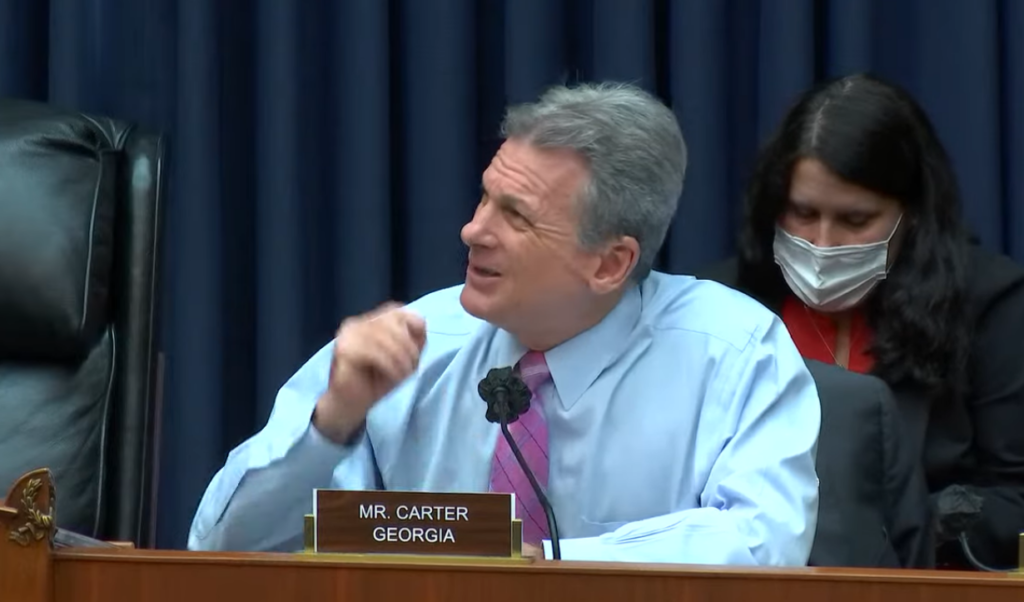Monday’s hearing on electric vehicles at the House Committee on Energy and Commerce showed a substantial partisan split on the sector’s future, with little talk in the way of what role the government will play in making more of the green economy supply chain local.
The hearing, titled “Charging Forward: Securing American Manufacturing and Our EV Future” had Democrats and Republicans sparring over the Biden administration’s policies on fossil fuels and the plausibility of moving to a post-carbon future.
Rep. Kathy Castor (D-FL-13) was one of only two members of Congress who asked about government incentives to support the market. “EVs will help Americans avoid gasoline price spikes, but how important are these tax breaks to getting people to buy them,” she asked.
Bob Holycross, Vice President for Sustainability, Environment and Safety Engineering at Ford Motor Company, and of four witnesses on the panel, said tax incentives were “one of the highest priorities”, adding that bringing manufacturing to scale was another way to lower prices.
EV tax incentives are capped out once an automaker has already sold 200,000 vehicles. Moreover, those tax incentives also go to producers that make cars abroad, including Ford’s Mach-E Mustang in Mexico and the Tesla rival Polestar, made by Chinese manufacturer Geely in China. Polestar buyers also get the $7,500 tax credit.
Rep. Kurt Schrader (D-OR-5) said government action is needed, but the new EV industry is mostly being led by consumer demand.
For some, that was just happy talk.

Rep. Lisa Blunt Rochester (D-DE): We need to expand supply chains and make EV supply chains here. This is important to the U.S. economy and the nation. Am I right?
Holycross: Absolutely. It’s why you need to invest in R&D and in workforce development so you can compete with Europe and China which are moving faster.
Rep. Rochester was worried that the move to electrification meant less labor in manufacturing traditional gas-powered engines and parts, like engine transmissions. She expressed her concern that more autoworkers would end up being left behind than are included in this new auto wave.
Holycross talked about Ford’s new plants in Tennessee and Kentucky that are making EVs and then said that they were investing in workforce training.
Rep. Buddy Carter (R-GA-1): We hear a lot about consumer demand, but don’t government subsidies help drive this demand for EVs?
Holycross: Yes.
Carter: Don’t get me wrong, I think EVs are great, but a lot of this is not the consumer. It is going to depend on government subsidies, including building charging stations.
Holycross: We need it to move this forward and sustain the position we have in the EV market.
Carter: We can’t declare war on fossil fuels in the process. I am in favor of renewable energy. But a war on fossil fuels has to stop and we have to have an all of the above energy strategy, or we will never achieve what we are trying to achieve.
Much of the energy argument came from the fact that the electricity grid will have to nearly double in capacity.
Of note, the Biden administration has said that it wants solar utility stations to power about 40% of America’s electricity by 2035. It’s currently less than 5%. Last month, Biden eliminated tariffs on utility-scale solar, handing the market to China, the dominant exporter of double-sided solar panels used by power companies.
Thomas Pyle, President of the Institute for Energy Research, was the main witness arguing that EVs were unlikely to become a force on American roads anytime soon. And that massive infrastructure buildup of the energy grid was needed, including EV charging stations. Some of this was addressed in the recently signed infrastructure law.
Thomas Pyle: If you’re going to go all EV, you also need to double your power generation capacity.
Rep. Bob Latta (R-OH-5): How are we going to do that?
Pyle: Good question. In Maine, in the last election, voters rejected by a margin of 60 to 40 a transmission line going from Canada to Massachusetts. They didn’t want it going through their state. If we are serious about this, then Congress has to streamline regulations and impediments to getting things built here. I’m not seeing movement on this issue. I’m also seeing the government rejecting mine permits, for example.
EVs: More Resources to Dig Up
It is clear in Washington that EVs are not powered by Pixie Dust. There is a consensus now that something has to be done to diversify the supply of the key elements that go into making these long-range batteries, especially lithium, nickel, and cobalt.
Companies are also looking into new chemical mixtures and new minerals that can be used in battery manufacturing.
Rep. Debbie Lesko (R-AZ-8) mentioned EV manufacturer Lucid Motors, and a company called KORE Power, makers of lithium batteries, as being instrumental to the Arizona green economy. “We are a kind of leader in this industry in Arizona,” she said. Nikola Motor Company is also in Arizona, having spent upwards of $600 million to set up an assembly line there.
But Lesko was yet another Committee member highlighting the difficulties ahead of building and maintaining an EV supply chain. For example, EVs need more copper than standard vehicles. Resolution Copper, a joint venture between BHP and Rio Tinto, have a mine there. “They invested in the Trump years to go ahead and produce copper. It is estimated to have about 25% of U.S. copper demand right here,” she said. Then things stalled out.
Lesko: The Biden administration has put that on hold. How in the world are we supposed to put all these EVs on the road when you are calling on foreign companies and China for all the materials. This is not going to work.
Pyle: No. It’s not going to work. If you say you are for EVs, you have to get off of what would be a crippling dependence on China for materials…if we are going to travel down this road.
***Read Michael Stumo’s op-ed “Clean Energy Requires a Mining Renaissance” in the Las Vegas Sun ***
Lesko: Biden wants to Buy American. Let’s encourage him to do it instead of just hearing empty rhetoric. Let’s do the mining in the U.S. We can do it. We should do it.
In addressing Natalie King, Chief Executive Officer of Dunamis Clean Energy Partners, a clean energy consulting firm espousing domestic supply chain needs, Rep. Frank Pallone (D-NJ-6) asked what was so important about Buy American for this new, highly disruptive economic sector.
Buy American “decreases our dependency on outside countries,” King responded, though it is unclear if she and Pallone were thinking of Buy American Act rules. Those rules only impact government purchases. Unless the government is buying EV power stations or government vehicles, then the private sector will go towards the path of least resistance. And that path will be paved by countries with the least obstacles and the lowest costs.
Back to mining, Pallone highlighted a deal between Redwood Materials, a battery recycling company started by an ex-Tesla executive, and Ford.
CPA member American Manganese is also in the battery recycling business for the EV supply chain.
“The really exciting part (about Redwood) is that you can get these materials from end-of-life batteries from cars, and put that back into the production process,” said Holycross. “When you couple that with all the R&D on metals, chemicals, for new battery technologies, you can reduce dependence on foreign sources.”
Witnesses
Bob Holycross
Vice President, Sustainability, Environment and Safety Engineering
Ford Motor CompanyNatalie King
Chief Executive Officer
Dunamis Clean Energy Partners, LLCCassandra Powers
Senior Managing Director
National Association of State Energy OfficialsThomas Pyle
President
Institute for Energy Research












